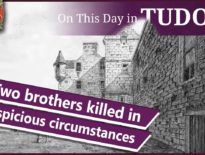On this day in Tudor history, 4th August 1549, in the reign of King Edward VI, the Battle of Woodbury Common, part of the Prayer Book Rebellion, took place on Woodbury Common, near the village of Woodbury in East Devon.
The battle was between the rebels and the crown troops commanded by John Russell, 1st Earl of Bedford. Although the rebels fought valiantly, they were defeated.
Find out more about the battle and what caused the Prayer Book Rebellion of 1549 in today's talk.
Also on this day in Tudor history, 4th August 1540, thirteen men were executed in London - 12 by being hanged, drawn and quartered, and one by being hanged. Find out why these men were attainted and executed in last year’s video:
Also on this day in history:
- 1557 – Burial of Anne of Cleves, fourth wife of Henry VIII, at Westminster Abbey.
- 1560 – Baptism of Sir John Harington, courtier, translator and author, in the church of All Hallows, London Wall. His godparents were Elizabeth I and William Herbert, 2nd Earl of Pembroke. In his “New Discourse of a Stale Subject, called the Metamorphosis of Ajax” (1596), Harington outlined his design for a flush toilet – a privy with a cistern and flush valve. The Ajax, as it was called, was eventually installed at Richmond Palace.
- 1566 – Death of Sir Martin Bowes, goldsmith, politician, Lord Mayor of London and Under- Treasurer of the Royal Mint in the Tower of London. He was buried at St Mary Woolnoth, Lombard Street, London.
- 1578 – Death of soldier Thomas Stucley at the Battle of Alcazar. Stucley was fighting against the Moors, with King Sebastian of Portugal, when his legs were blown off by a cannon shot.
- 1598 - William Cecil, 1st Baron Burghley, died at his home in London aged seventy-six. He was laid to rest at St Martin's Church, Stamford, in his home county of Lincolnshire.
- 1612 – Death of Hugh Broughton, scholar, theologian and Hebraist, in Cheapside, London. He was buried at St Antholin's Church. Broughton spent the last twenty years of his life petitioning for a new translation of the Bible. His works included “A Concent of Scripture” (1588), “An Epistle to the learned Nobilitie of England, touching translating the Bible from the Original” (1597) and “An Advertisement of Corruption in our Handling of Religion” (1604).
Transcript:
On this day in Tudor history, 4th August 1549, the Battle of Woodbury Common, part of the Prayer Book Rebellion, took place on Woodbury Common, near the village of Woodbury in East Devon. The battle took place at 4am and happened when the rebels, who had been defending Clyst St Mary, marched to Woodbury Mill where John Russell, 1st Earl of Bedford, and his Crown troops had camped for the night. The rebels were defeated.
In The ancient history and description of the city of Exeter (1765), John Hooker writes of the battle:
“Accordingly, about six days after, on Saturday 3rd August, he [Lord Russell] set out from Honiton, and marched in good order, towards Exeter, with about 1000 fighting men under his command; but leaving the direct high road, he came over the down towards Woodbury, and there pitched his camp that night at a windmill belonging to one Gregory Carie, Gent. When the rebels of St. Mary Clyst heard thereof, they forthwith assembled all their force, and marched forward until they came to the aforesaid mill, where they gave battle; and notwithstanding they fought most valiantly, at length they were defeated, and a great number of them slain.”
The 1549 Act of Uniformity had established The Book of Common Prayer, which set out the new legal form of worship in England. It was made compulsory in June 1549 which led to the Prayer Book Rebellion - also known as the Prayer Book Revolt, Prayer Book Rising, Western Rising and Western Rebellion - a series of revolts in the south-west of England which then spread into the east of England. The rebels called for the rebuilding of abbeys, the restoration of the Six Articles, the restoration of prayers for souls in purgatory, the policy of only the bread being given to the laity and the use of Latin for the mass. The final battle of the rebellion was the Battle of Sampford Courtenay on 17th August. The rebels were defeated and those who survived the battle fled to Launceston Castle, where they were captured and taken to the Tower of London.



Leave a Reply